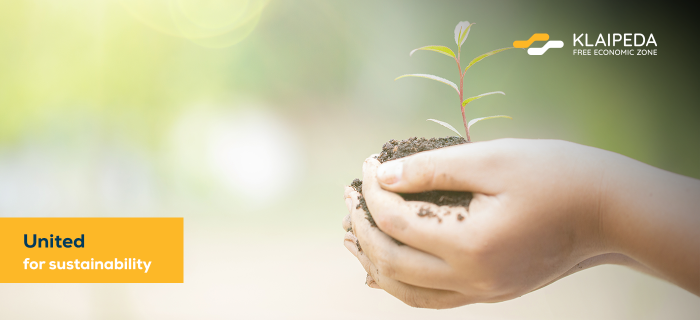News & Events
Watch our activity in one place
Community as a sustainability driver

Partnerships, strong communities, and togetherness are things that foster and fast track great sustainability initiatives. Such was the consensus by presenters at the 7th annual Nordic-Baltic Sustainable Business Summit, a virtual conference organized by the Nordic Chambers of Commerce in Lithuania, Lithuanian Responsible Business Association, and Nordic Council of Ministers office in Lithuania, in partnership with the Embassy of Finland in Lithuania.
Eimantas Kiudulas, the CEO of Klaipeda FEZ, was among the speakers and panelists of the summit, opened by Arja Makkonen, the Ambassador of Finland to Lithuania, and Lithuania’s European Commissioner Virginijus Sinkevicius this year.
Klaipeda FEZ received a special fDi Intelligence award for sustainability for initiatives by both the zone management company and investors this year, and so, E. Kiudulas was invited to share his experience of transforming the FEZ from an industrial territory into a sustainability-focused ecosystem at the summit.
“Sustainability agenda is already vital for one’s survival. Consumers require it and they agree to pay a premium for it. Consequently, companies follow suit and have sustainability agendas and strategies. Eventually, they want to work at locations that fit their sustainability visions. As a free zone, you can no longer expect sustainability-focused investors without having your own sustainability agenda,” E. Kiudulas said on stage.
He also argued that the COVID pandemic brought businesses and communities closer to each other across the globe. It also showed that much more could be done when cooperating.
“I believe that COVID will help to bring the future faster. It already hastened automation, digitalization, and other new things. What’s even more important, the pandemic proved that strategy is much more important than short term planning, and all pre-COVID sustainability strategies I know have prevailed. Also, having a ‘plan B’, adaptable leaders, and strong teams is crucial, of course, but we also witnessed that wonders can be done if leaders cooperate and if one’s closest neighbors and stakeholders are involved in both strategies and daily actions,” E. Kiudulas said.
The importance of sustainability-oriented partnerships was also emphasized by Salla Ahonen, the Vice President of Sustainability at NESTE, a Finnish energy giant. NESTE aims to achieve its own carbon neutral target by 2035 and the company has already implemented numerous initiatives that span from renewable electricity use to investment into sustainability-focused technologies, recycling and partnerships. Ms. Ahonen argued that partnerships are crucial in one’s pursuit of sustainability.
“The pandemic hasn’t changed our direction of sustainability. We have the commitment and awareness of the whole company. Big changes are never isolated though. And so we have a lot of collaborations with universities and research institutions. We are also working together with our customers and partners, and so sustainability-focused projects, such as industrial-scale electricity and windfarm implementations with Fortum, sustainable aviation fuel with airlines and various used cooking oil – to – diesel schemes with restaurant chains and cities become a reality. We believe in partnerships and togetherness, station by station, customer by customer,” Ms. Ahonen said.
Other presenters and panelists shared similar views. For instance, BIOK Laboratorija, a major Lithuanian cosmetics firm, has long been focusing on sustainability, yet the pandemic has in a sense opened its eyes when it comes to the complexity of its supply chain. Consequently, some more sustainable alternatives were discovered, according to the company’s CEO Romualda Stragiene.
Lithuania’s former minister of transportation and energy Rokas Masiulis was inviting Nordic companies to benefit from Lithuania’s strong logistics ecosystem. Though he argued that the logistics industry is probably not a major sustainability innovator yet, he agreed that this agenda is major, global, and irreversible.
Also, Nicholas Rosenberg Kjaer, the managing director at Volvo Lithuania, and Ruta Juciene, the Global Key Account Manager Europe at SAS, both agreed that the pandemic has not derailed the sustainability agendas of both companies, and they both argued that 2020 showed the importance of partnerships that already do and will further open doors to new sustainable products, services or fuels.
On behalf of Klaipeda Free Economic Zone management company team, we kindly thank the organizers for both a meaningful and impactful event, as well as for an opportunity for E. Kiudulas to share his insights with a solid audience.
